Rural Prosperity
Cooperatives: Building a Better Tomorrow
International Cooperatives Day 2025: Strengthening Rural Prosperity Through Shared Efforts
Posted On: 04 JUL 2025 2:18PM
|
Key Takeaways
- The United Nations has declared 2025 as the International Year of Cooperatives.
- This year, the world will celebrate International Day of Cooperatives on 5th July. The theme for International Cooperatives Day 2025 is “Cooperatives Build a Better World.”
- Union Minister Amit Shah will inaugurate country's first national-level cooperative university “Tribhuvan Sahkari University (TSU)” at Anand in Gujarat on 5th July.
- There are 3 million cooperatives worldwide, with the 300 largest cooperatives generating a turnover of USD 2,409.41 billion.
- Govt of India has issued Model Bye-Laws for Primary Agricultural Credit Societies (PACS) to standardize and modernize their functioning.
- PACS are being computerized. A total of 67,930 PACS are approved for computerization; ₹752.77 crore released to states and ₹165.92 crore to NABARD for computerization.
- Multipurpose PACS/Dairy/Fisheries Cooperative Societies are being established in every Panchayat/Village. As on 31st March 2025, 18,183 new MPACS, Dairy & Fishery cooperatives have been registered.
- White Revolution 2.0 inaugurated on 25 Dec. 2024, aims to boost milk procurement by 50% over 5 years.
|
Introduction
India, a land where growth resonates through its farms, villages and cities, finds a silent yet powerful force in cooperatives. From helping farmers secure fair prices to empowering women and small entrepreneurs, cooperatives have played a crucial role in weaving the fabric of inclusive growth and celebrating the spirit of “Sahkar se Samriddhi.” What began as a small journey in the pre-independence era has grown into a network of 8.42 lakh cooperatives across India. From celebrated names like Amul to major players like NABARD, KRIBHCO, and IFFCO, and countless smaller entities working quietly on the ground, cooperatives continue to empower people across the country. Their global significance is also evident, with the United Nations declaring 2025 as the International Year of Cooperatives.
Cooperatives are people-centered enterprises owned, controlled and run by and for their members to realise their common economic, social and cultural needs and aspirations.
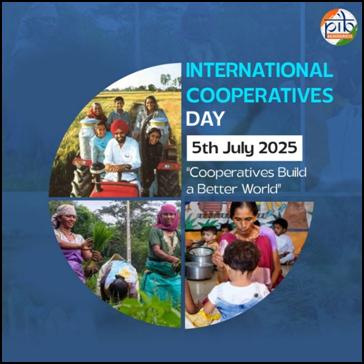
Every year, the International Day of Cooperatives is observed on the first Saturday of July. The theme for this year’s International Cooperative Day and Year is Cooperatives: Driving Inclusive and Sustainable Solutions for a Better World highlights how cooperatives drive sustainable development, build resilient communities and take growth to the last mile. This year, the International Day of Cooperatives on 5th July focuses on practical solutions and real impact.
On this occasion, Union Home Minister and Minister of Cooperation Shri Amit Shah will perform 'Bhoomi Pujan' and lay the foundation stone of the country's first national-level cooperative university, “Tribhuvan Sahkari University (TSU),” at Anand in Gujarat.
Cooperatives for a Sustainable Future
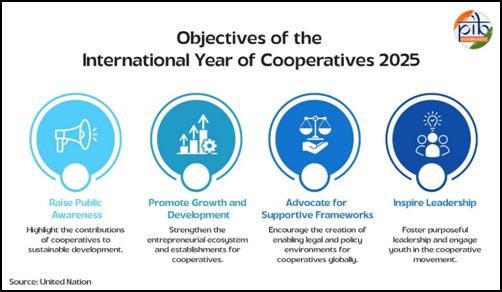
The theme “Cooperatives Build a Better World” highlights their role in tackling today’s global challenges and advancing the UN SDGs (Sustainable Development Goals) by 2030. Cooperatives now connect over 12% of humanity through 3 million cooperatives worldwide, with the 300 largest cooperatives generating a turnover of USD 2,409.41 billion. They also power sustainable economic growth by providing quality jobs and work opportunities to 280 million people, accounting for 10% of the world’s employed population.
CoopsDay, or International Day of Cooperatives was first celebrated in 1923 and officially recognized by the UN in 1995. It highlights how cooperatives help people work together, build stronger and self-reliant communities, and promote the values of democracy, solidarity, and sustainability.
Evolution of Cooperatives in India
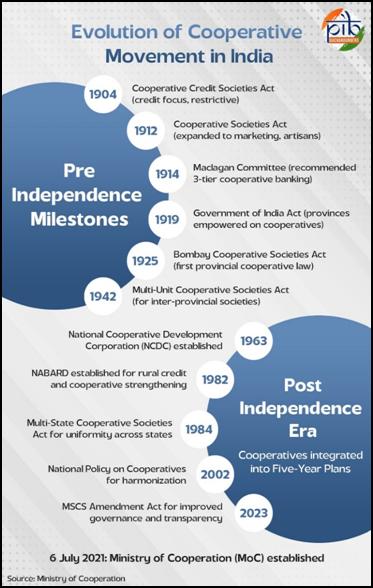
In India, 8.42 lakh cooperative units drive inclusive growth and engaged in activities like production, processing, marketing, housing, transport and more. Even before formal laws, villages in India practiced cooperation through shared efforts like building tanks and protecting forests, and informal systems like Chit Funds, Kuries, Bhishies, and Phads. In 1891, Punjab saw a cooperative manage village land, reflecting India’s long tradition of working together.
India’s Cooperative Sector: Glance
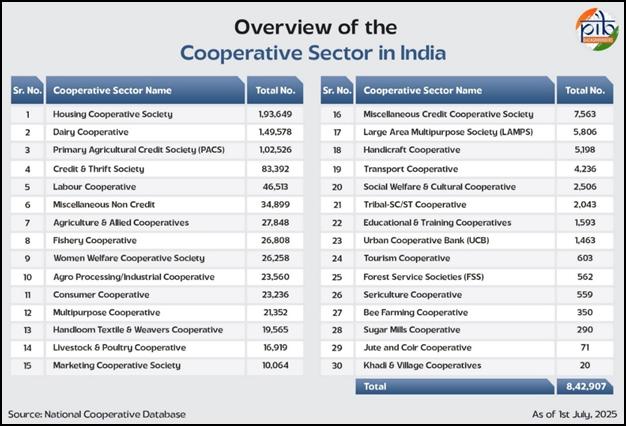
Cooperative societies in India operate across various sectors such as Agriculture, Credit and Banking, Housing and Women’s Welfare. They are instrumental in promoting financial inclusion by providing credit to farmers and small entrepreneurs who may have difficulty accessing conventional banking services. These societies play a crucial role in rural development, empowering local communities and reducing socio-economic disparities.
Major Initiatives by Ministry of Cooperation
The government is empowering cooperatives and PACS to enhance rural incomes, strengthen local economies and ensure farmers get better market opportunities. These reforms aim to make cooperatives key players in India's growth story.
PACS (Primary Agricultural Credit Societies) are grassroots cooperative credit institutions that provide short-term loans, seeds, fertilizers, and essential services to farmers at the village level, forming the backbone of India's cooperative credit structure.
Strengthening Cooperatives: Key Developments
PACS & Digitalization
- Model Bye-Laws: The Ministry of Cooperation issued Model Bye-Laws for PACS (Primary Agricultural Credit Societies) on 5 January 2023 to standardize and modernize their functioning across India. Currently, Model Bye-Laws adopted by 32 States/UTs.
- Computerization: A total of 67,930 PACS are being computerized, with ₹752.77 crore given to States and ₹165.92 crore to NABARD. So far, 54,150 PACS are on ERP software, and 43,658 are live. The project for 18,000 PACS was inaugurated on 24 February 2024, boosting digital operations in cooperatives.
- New Multipurpose PACS/Dairy/Fisheries Societies: The Cabinet approved the plan on 15 February 2023, SOP was launched on 19 September 2024, and by March 2025, 18,183 new multipurpose cooperative societies were registered across the country.
- Decentralized Grain Storage: Approved on 31 May 2023, the decentralized grain storage program has set up godowns in 11 PACS, with foundation stones laid for 500 more on 24 February 2024.
- PACS as CSCs: Following the MoU signed on 2 February 2023, 43,014 PACS are now providing CSC (Common Service Center) services, with transactions crossing ₹67 crore.
- PACS as Jan Aushadhi Kendras: 4,516 PACS applied for Jan Aushadhi Kendras, 2,755 approved, 727 store codes allotted.
- PACS as PMKSK (Pradhan Mantri Kisan Samridhi Kendra): 36,689 PACS upgraded as PMKSK.
- Computerization of ARDBs (Agriculture and Rural Development Bank): 1,800 units approved for computerization of ARDBs and launched 30 Jan 2024.
White Revolution 2.0
White Revolution 2.0 has been launched by the Ministry of Cooperation to boost milk production and procurement by dairy cooperatives.
- White Revolution 2.0 was launched on 19 Sep. 2024 and inaugurated on 25 Dec. 2024.
- Goal: 50% increase in milk procurement over 5 years.
- So far, 9,695 Dairy Cooperative Societies has been registered across 27 States/UTs.
Banking Empowerment
- Micro-ATMs to PACS: Launched May 2023; 6,446 micro-ATMs distributed in Gujarat.
- Under the “Cooperation among Cooperatives” campaign, the SOP for issuing RuPay Kisan Credit Cards to cooperative society members was launched on 19 September 2024.
- 27 lakh deposit accounts opened
- 9,915 micro-ATMs distributed
- 32.1 lakh RuPay KCCs issued
- 9,200 dairy PACS made Bank Mitra
FPOs & Organic Farming
- New FPOs (Farmer Producer Organization): 1,867 FPOs formed in cooperative sector by NCDC.
- FFPOs (Fish Farmer Producer Organizations): 70 FFPOs registered; ₹58.93 cr disbursed for fisheries cooperatives.
- National Cooperative Organics Limited (NCOL) now has 5,185 PACS as members and has launched 21 Bharat Organic products.
Fuel & Ethanol Initiatives
- PACS as LPG Dealers: In a step towards expanding their business activities, two PACS from Jharkhand have applied to become LPG dealers.
- PACS Petrol Pumps: 188 PACS from 5 States having Bulk Consumer Pumps have given consent for conversion into Retail Outlets, out of which 59 PACS have been commissioned by the Oil Marketing Companies (OMCs); 286 applied for new dealerships.
Support for Cooperative Sugar Mills (CSMs):
- ₹10,000 cr loan scheme via NCDC for strengthening of Cooperative Sugar Mills; ₹9,893 cr sanctioned to 48 CSMs.
- Support to Cooperative Sugar Mills (CSMs) for conversion of their ethanol plants into multi-feed ethanol units to enable them to produce ethanol from Maize also. 63 CSMs have been identified for the initiative. They will be able to produce an additional 40-45 crore litres of ethanol per year.
- Preference in ethanol purchase: 24,650 KL procured by Oil Marketing Companies (OMCs) from 11 CSMs.
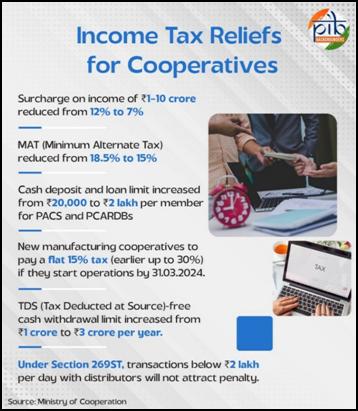
Financial Reforms for Cooperatives
- Income Tax Surcharge: The surcharge on Income Tax for Cooperative Societies with income from Rs 1 Crore to Rs 10 Crore has been reduced from 12% to 7% at par with Companies.
- MAT (Minimum Alternate Tax): Reduced from 18.5% to 15% for Cooperative Societies.
- Cash Deposit/Loan Limit: Raised from ₹20,000 to ₹2 lakh/member.
- Increase in the limit of Tax Deducted at Source (TDS) in Cash Withdrawal: Raised from ₹1 cr to ₹3 cr/year.
- ₹46,524 cr tax relief for sugar mills; GST on molasses reduced from 28% to 5%.
Cooperative Banking Reforms
- UCBs (Urban Cooperative Banks) allowed to open new branches and provide door-step banking. Rural Co-operative Banks will now be able to lend to commercial real estate - residential housing sector, thereby diversifying their business.
- RBI approved umbrella Organisation NUCFDC (National Urban Cooperative Finance and Development Corporation) for UCBs; inaugurated on 2 Mar 2024.
- RBI approved Shared Services Entity (SSE) under NABARD (National Bank for Agriculture and Rural Development) for Rural Cooperative Banks (April 2025). The Authorised Capital of SSE will be ₹ 1,000 crore. The registration of SSE as private limited company and the first set of services will be rolled out in FY 2025-26.
Global & National Initiatives
- National Cooperative Database: 8.42 lakh societies mapped; NCD Portal launched on 8 Mar. 2024.
- National Cooperation Policy 2025: The final draft of the new policy, replacing the 2002 policy, is ready for launch, aligning with the “Sahkar-se-Samriddhi” initiative and the Viksit Bharat 2047 vision.
- International Year of Cooperatives 2025: The United Nations has declared 2025 as the IYC 2025 to highlight the role of cooperatives in economic growth, social inclusion, and sustainability. The Ministry of Cooperation has developed an action plan in collaboration with National Cooperative Federations, State Governments, Central Ministries and other stakeholders emphasizing transparency, policy reforms and rural economic transformation through PACS. Activities include training, board meetings, cooperative flag hoisting, exhibitions and business expansion workshops at District, State, and National levels. To ensure effective execution, committees at national, state, and district levels have been formed.
- ICA Global Cooperative Conference: The International Cooperative Alliance’s (ICA) 2024 Global Cooperative Conference in New Delhi in Nov 2024, marked an important moment in the history of Indian cooperative movement as over 3,000 cooperators came together for the UN International Year of Cooperatives 2025 (IYC 2025), demonstrating the power of cooperatives in tackling global challenges such as inequality, climate and conflict.
- Tribhuvan Sahkari University: As an important initiative to strengthen the cooperative movement in India, Tribhuvan Sahkari University is being established in honour of Tribhuvan Das Patel, who, under the guidance of Sardar Patel, played a key role in laying its foundation. The university aims to provide technical education, accounting, administrative knowledge, and specialised training to professionals in the cooperative sector, ensuring a steady pipeline of trained manpower to support and expand cooperatives across the country.
NCDC Performance
The National Cooperative Development Corporation (NCDC) was established by an Act of Parliament in 1963 as a statutory Corporation under the Ministry of Cooperation.
- FY 2023-24: Disbursed ₹60,618.47 cr (48% growth).
- FY 2024-25: Disbursed ₹95,000 cr (~58% growth).
- Target: ₹1 lakh crore loan disbursal in the next 3 years.
₹2000 cr bond issuance permitted for the development of the cooperative sector.
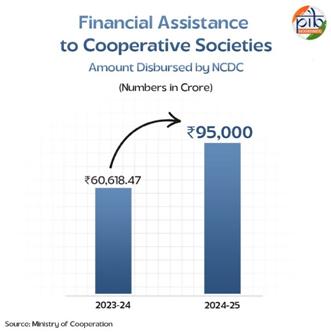
Conclusion
Cooperatives are not just institutions; they are a people’s movement shaping India’s future from the grassroots. By empowering farmers, women, and small entrepreneurs, they foster inclusive growth and resilient communities. As India celebrates International Cooperatives Day 2025, it reaffirms its commitment to “Sahkar se Samriddhi,” ensuring cooperatives continue to drive sustainable development and take prosperity to every corner of the nation.
References
United Nations:
Ministry of Cooperatives
- https://www.cooperation.gov.in/sites/default/files/2022-12/History_of_cooperatives_Movement.pdf
- https://www.pib.gov.in/PressReleasePage.aspx?PRID=2073319
- https://cooperatives.gov.in/en
- https://www.pib.gov.in/PressReleasePage.aspx?PRID=2030797
- https://www.cooperation.gov.in/sites/default/files/2025-03/Annual%20Report%202023-24_English.pdf
- https://www.ncdc.in/index.jsp?page=genesis-functions=hi
- https://ncel.coop/
- https://ncol.coop/
- https://www.pib.gov.in/PressReleseDetail.aspx?PRID=2039069#:~:text=The%20proposed%20university%20is%20likely,sector%20for%20successful%20implementation%20of
- https://ncct.ac.in/index.php
- https://www.pib.gov.in/PressReleasePage.aspx?PRID=2115556
Ministry of Fisheries, Animal Husbandry & Dairying
Click here to download PDF
*****
SK/ SM
(Backgrounder ID: 154829)
Visitor Counter : 2122